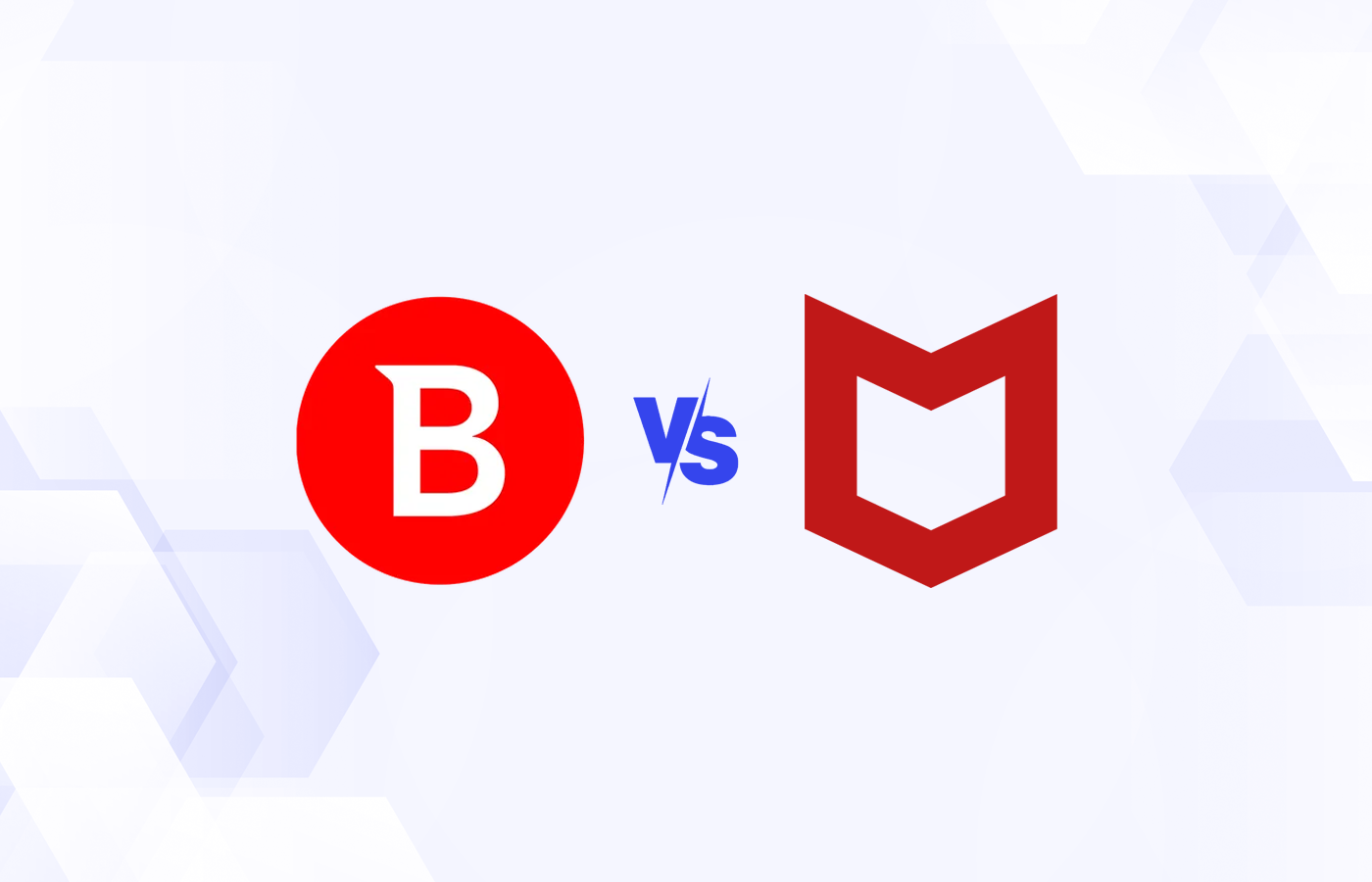With cybersecurity becoming increasingly complex, it is necessary to have a good way to handle your passwords to keep all your private stuff safe. Amidst all the many tools available on the market, 1Password stands out as a great pick. It’s got the best security features and is relatively easy to use.
Whether you’re a business or just someone trying to keep track of your online accounts, 1Password is like the Swiss Army knife for password management. It makes dealing with passwords a breeze and tightens your digital life. Let us walk you through some insights into its application in the business environment, the essential steps on how to use 1Password, and offer best practices to ensure optimal network security.
Table of Contents
How to Leverage 1Password to Boost Business Security
1Password doesn’t just keep your passwords safe; it also helps your team work together without a hitch, plays nice with other work tools, and has some serious security chops. Here are some ways businesses can leverage 1Password to enhance security and improve operational efficiency:
Scalable, Secure Password Management
1Password’s business plan offers scalable, secure password management trusted by over 100,000 businesses worldwide, providing a centralized platform for storing, managing, and securely accessing all passwords. Its end-to-end encryption ensures that only authorized users can access stored credentials, reducing the risk of weak or reused passwords and maintaining strong, unique passwords across all accounts, effectively safeguarding against cyber threats.
Admin Controls for Enhanced Security
1Password’s admin controls enable businesses to manage employees easily, set permissions, and delegate responsibilities, ensuring that sensitive information is accessible only to those who need it. Administrators can assign roles and create department-specific vaults to compartmentalize data, reducing the risk of exposure during a breach. Additionally, they can swiftly revoke access for departing employees, maintaining security across the organization.
Advanced Reporting for Proactive Security
1Password’s advanced reporting features enable administrators to proactively monitor and address potential risks. These reports highlight compromised employee emails, vulnerable passwords, and other security issues, allowing businesses to take immediate action, such as prompting password changes. Regularly reviewing these reports helps prevent breaches before they occur, safeguarding your business from potential network security threats.
Free Family Accounts for Employees
Security extends beyond the workplace, and 1Password supports this by offering free family accounts to employees under its business plan. By equipping employees to manage their passwords securely at home, businesses can foster a culture of security beyond the office.
When employees practice strong, unique password habits in their personal lives, they are more likely to apply these practices at work, enhancing overall security and reducing the risk of human error that could compromise the business.
Cross-Platform Availability
1Password is available on Mac, iOS, Windows, Android, Chrome OS, and Linux, allowing all employees to securely access the tools they need, regardless of their device. This cross-platform availability enables businesses to maintain consistent security practices across all devices and operating systems, standardizing password management processes and making it easier to implement and enforce strong security protocols throughout the organization.
24/7 Dedicated Business Support
Managing your 1Password account requires access to reliable support, particularly during security issues or when assistance is required. With 1Password’s business plan, you benefit from 24/7 dedicated business support, ensuring expert help is always available for troubleshooting, setting up new features, or managing employee access. This continuous support allows businesses to quickly resolve issues, minimize downtime, and maintain a robust and effective security system.
Essential Steps to Get Started with 1Password
To effectively utilize 1Password, the best enterprise password manager in 2024, it’s essential to follow a structured approach. Follow the steps below to ensure a smooth onboarding experience with 1Password and take control of your digital security.
Step 1: Choose a Subscription Plan
The first step in getting started with 1Password is selecting the right subscription plan that aligns with your needs. 1Password offers several options: individual, family, team, and business plans. Each plan provides different features and levels of support.
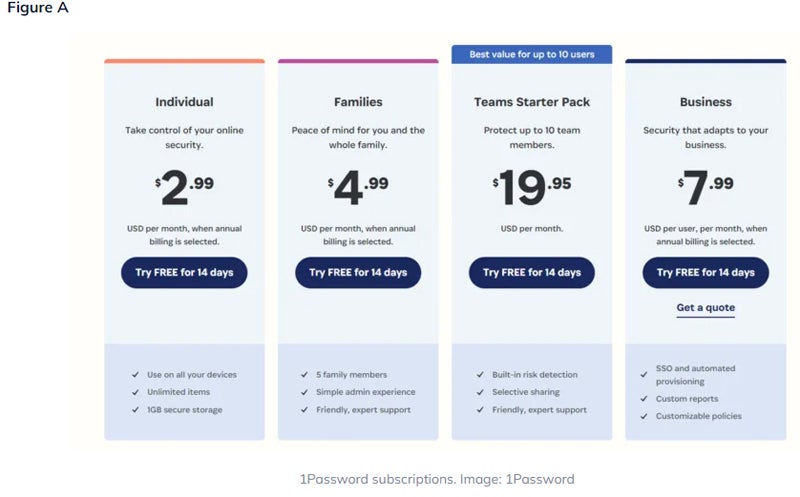
| Individual | Families | Team Starter Pack | Business |
|---|---|---|---|
| • 1 personal account with unlimited devices • Advanced security with authenticated encryption, PAKE, and more • Alerts for compromised websites and vulnerable passwords • 24/7 customer support • Available on Mac, iOS, Windows, Android, Chrome OS, and Linux | • 5 family members, unlimited devices • Shared vaults let family members choose what they want to share (or keep private) • Advanced security with authenticated encryption, PAKE, and more • Alerts for compromised websites and vulnerable passwords • 24/7 customer support • Available on Mac, iOS, Windows, Android, Chrome OS, and Linux | • Effortless, secure password management for the whole team • Admin controls to manage team members and share permissions • Alerts for compromised websites and vulnerable passwords • Unrivaled 24/7 customer support • Available on Mac, iOS, Windows, Android, Chrome OS, and Linux | • Scalable, secure password management trusted by over 100,000 businesses • Admin controls to manage employees, permissions, and delegate responsibilities • Advanced reporting for compromised employee emails and vulnerable passwords • Free family accounts for all employees • 24/7 dedicated business support • Available on Mac, iOS, Windows, Android, Chrome OS, and Linux |
Step 2: Set up the Desktop App, Web App & Browser Extension
Once you’ve selected your subscription plan, the next step is to set up your 1Password account across your preferred platforms. Here’s how to do it:
- Create Your Account: Start by following the on-screen prompts to create your new account. Enter your name and email address, then click “Next.”
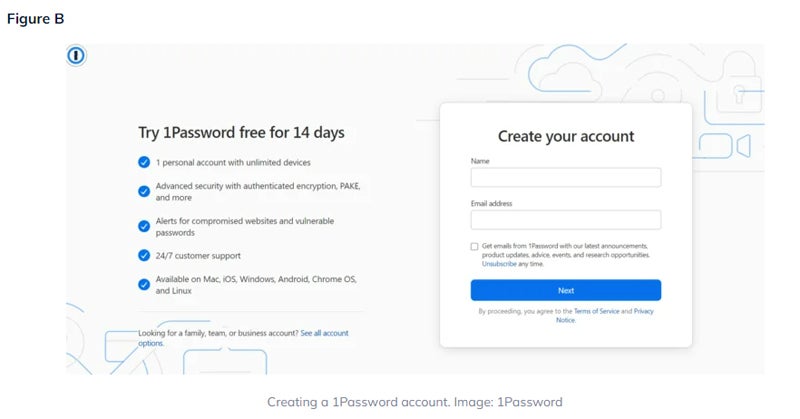
- Set Your Master Password: You’ll be prompted to create a strong master password. This password is crucial as it’s the key to unlocking your vault, so choose something secure and memorable.
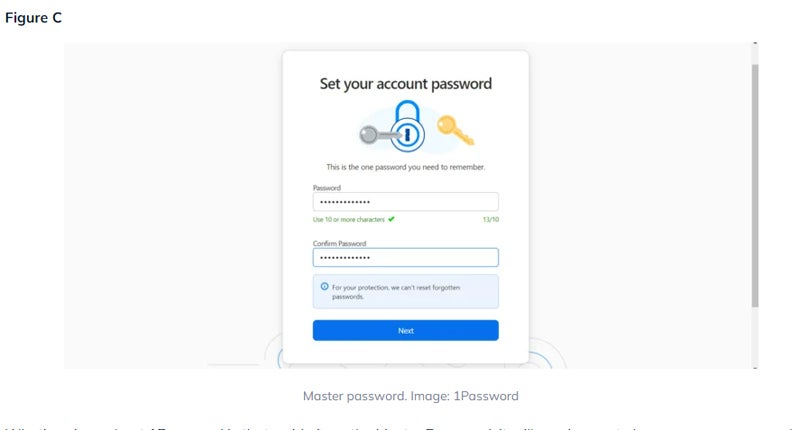
- Retrieve Your Secret Key: After setting up your master password, you’ll receive a unique Secret Key. This key adds an extra layer of security to your account, so be sure to save it in a secure place.
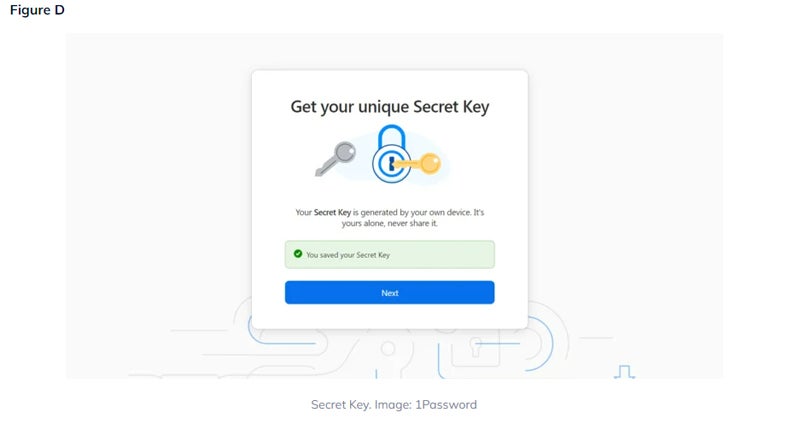
- Install the Browser Extension: Once your account is set up, you’ll be prompted to install the 1Password browser extension. Click “Get it now” to proceed, and follow the steps to add the extension to your browser (e.g., Chrome).
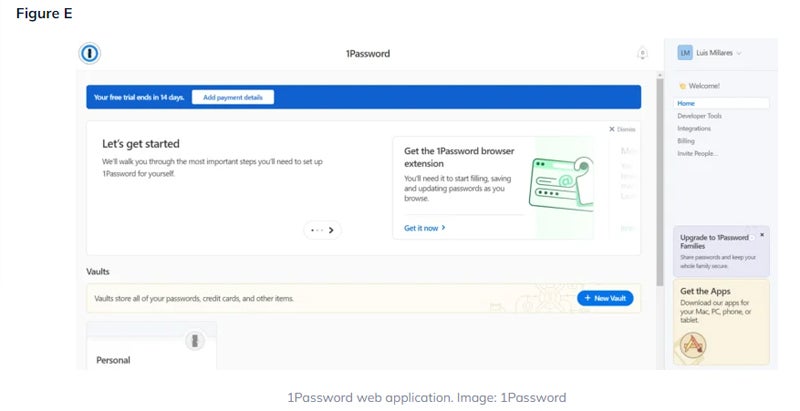
5. Complete Setup: With the desktop app, web app, and browser extension successfully installed, you can start using 1Password to manage your passwords securely.
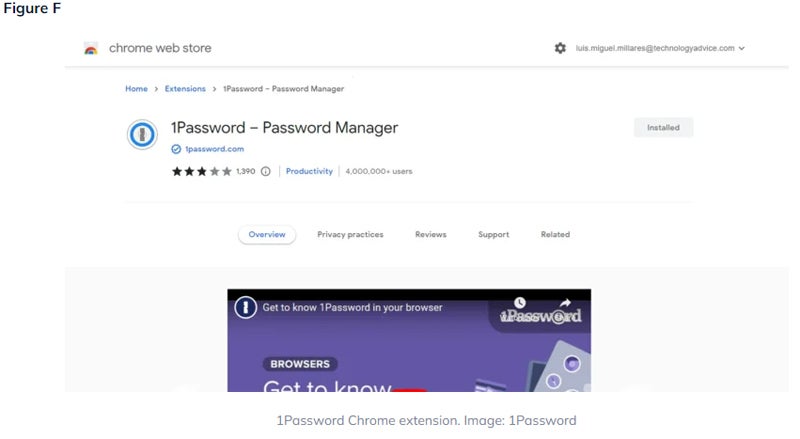
Step 3: Start Using 1Password
With the setup complete, you can now begin using 1Password to store and manage your passwords easily. Enjoy the peace of mind that comes with enhanced security and streamlined access to your digital life.
As you explore the features and benefits of 1Password, you might also be interested in how it compares to other top password managers like Dashlane. For a detailed comparison, check out this comprehensive guide.
5 Best Practices for Using 1Password
With cybersecurity being super important, using a strong business password manager like 1Password is necessary for keeping all your private stuff safe. However, simply using the tool is not enough; following best practices is crucial to maximizing its effectiveness and ensuring the highest level of security. Let us walk you through the key strategies for using 1Password to its full potential.
Regularly Update Your Master Password
Your master password is the gateway to all your stored credentials, so keeping it as secure as possible is vital. Updating your master password is a simple yet effective way to enhance security. When creating a new master password, ensure it is strong and unique, consisting of a mix of letters, numbers, and special characters. Don’t use passwords you’ve previously used for other accounts, as this could potentially jeopardize your security in case of an account breach.
By periodically changing your master password, you reduce the risk of unauthorized access to your 1Password account, keeping your data safer from evolving threats.
Use Strong & Unique Passwords for All Entries
One of the fundamental practices when using 1Password is to generate strong, unique passwords for each entry. In the event of a breach, weak or reused passwords pose a significant vulnerability due to their easy guessing or exploitation. 1Password’s built-in password generator allows you to create complex passwords that are difficult to crack, significantly enhancing your overall security.
When adding new entries to 1Password, resist the temptation to reuse passwords across multiple sites. Each account should have its distinct password, reducing the risk that a breach of one account could compromise others.
Review & Clean Up Your Vaults Regularly
Over time, your 1Password vaults can become cluttered with outdated or unnecessary entries. Regularly reviewing and cleaning up your vaults is an important maintenance task that helps keep your password manager organized and efficient. Removing obsolete information reduces clutter and minimizes the risks associated with managing old or unused credentials.
Set aside time periodically to go through your vaults, deleting any entries that are no longer relevant or necessary. This practice helps ensure that your 1Password account remains streamlined and straightforward to navigate, making finding and managing your active credentials simpler.
Enable Two-Factor Authentication for Added Security
Two-factor authentication (2FA) is a critical security measure that adds an extra layer of protection to your 1Password account. Even with a compromised master password, 2FA significantly reduces the likelihood of unauthorized access by requiring a second form of verification.
Enabling 2FA on your 1Password account is a straightforward process and substantially boosts your overall security. We recommend activating this feature as part of your standard security practices to safeguard your account with the latest and most effective security measures.
Regularly Backup Your Data
While 1Password offers secure cloud storage, it’s wise to regularly back up your data to ensure you have a copy in case of unforeseen events. Regular backups provide an additional safety net, allowing you to recover your information quickly in case of data loss or corruption.
To back up your 1Password data, you can export and store your vaults securely offline. This ensures you maintain control over your critical information, even if you encounter technical issues or disruptions to cloud services.
When implementing a strong business password manager like 1Password, it’s essential to follow best practices to maximize security. For a comparison of how 1Password stacks up against other options, such as Keeper, you can check out this detailed comparison.
1Password Administrator Tips to Keep in Mind
As an administrator for 1Password, you have several powerful tools at your disposal to enhance security and manage your team’s access effectively. Here are some key tips to help you make the most of 1Password’s features:
Leverage Watchtower for Individual User Reporting
Watchtower is an essential feature for monitoring individual user accounts and ensuring their security. It provides real-time alerts and detailed reports on compromised passwords, security vulnerabilities, and other critical issues. To use Watchtower effectively:
- Monitor Security Alerts: Regularly check Watchtower for notifications about compromised passwords or vulnerable entries. Address these issues promptly to maintain a secure environment.
- Encourage Regular Reviews: Prompt users to review their security status and update their passwords as needed. This helps prevent potential breaches and keeps your data safe.
- Educate Users: Provide guidance on using Watchtower’s features, ensuring that all team members are aware of their importance and know how to respond to alerts.
For a comparison of Watchtower with similar features from other password managers, such as Bitwarden, check out this comparison.
Utilize Insight for Advanced Reporting
If you’re on the Business tier, take advantage of 1Password’s advanced reporting features through Insights. These tools offer a comprehensive view of your organization’s security posture and help you manage potential risks more effectively:
- Access Detailed Reports: Use Insights to generate reports on compromised employee emails, vulnerable passwords, and overall security trends. This data helps you identify areas for improvement and take proactive measures.
- Analyze Security Metrics: Review metrics and trends to better understand your organization’s security landscape. This lets you make informed decisions about policy changes or additional training requirements.
- Act on Insights: Regularly review and act on the information provided by Insights. Address any vulnerabilities or issues highlighted in the reports to enhance your security posture.
Bottom Line: Using 1Password for Business Growth
1Password is a powerful tool for managing passwords and securing sensitive information. Whether you’re an individual looking to simplify your password management or a business seeking advanced security features, 1Password offers a range of solutions to meet your needs.
For more information on 1Password and its features, you can explore additional resources such as 1Password reviews, password manager comparisons, and network security insights.







